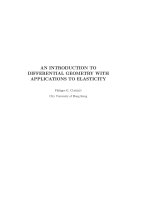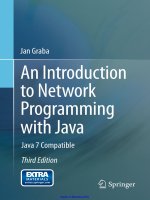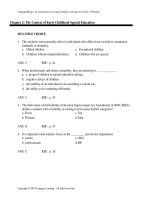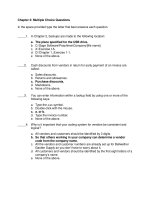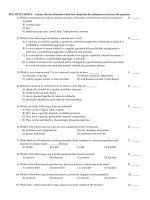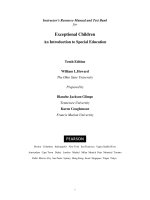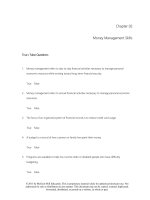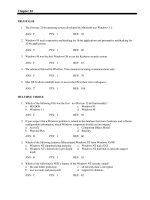An introduction to young children with special needs birth through age eight 4th edition gargiulo test bank
Bạn đang xem bản rút gọn của tài liệu. Xem và tải ngay bản đầy đủ của tài liệu tại đây (218.03 KB, 10 trang )
Gargiulo/Kilgo, An Introduction to Young Children with Special Needs, 4th Edition
Chapter 2: The Context of Early Childhood Special Education
MULTIPLE CHOICE
1. This inclusive term generally refers to individuals who differ from societal or community
standards of normalcy.
a. Gifted children
c. Exceptional children
b. Children with developmental delays
d. Children who are special
ANS: C
REF: p. 24
2. When professionals talk about a disability, they are referring to _____________.
a. a group of children in special education settings
b. cognitive delays of children
c. the inability of an individual to do something a certain way
d. the ability to do something differently
ANS: C
REF: p. 24
3. The Individuals with Disabilities Education Improvement Act Amendment of 2004 (IDEA)
defines a student with a disability according to how many distinct categories?
a. Seven
c. Ten
b. Thirteen
d. Nine
ANS: B
REF: p. 27
4. It is imperative that teachers focus on the _________ and not the impairment.
a. parent
c. child
b. professionals
d. IEP
ANS: C
REF: p. 28
Copyright © 2014 Cengage Learning. All rights reserved.
Test Bank 2-2
5. When professionals talk about children being at-risk, they are speaking about children who
_____________.
a. have been formally diagnosed with a disability
b. have been formally tested by a specialist
c. have not been formally identified as having a disability
d. have been informally identified as having a disability
ANS: C
REF: p. 26
6. Children with a diagnosed medical disorder of known etiology and predictable prognosis or
outcome are considered to manifest a(n) _____________.
a. established risk
c. developmental risk
b. biological risk
d. risk at birth
ANS: A
REF: p. 26
7. Children with exceptionalities are to be educated to the maximum extent appropriate, with
typical students.
a. Free and Appropriate Public Education c. Individualized Education Program
b. Least Restrictive Environment
d. Procedural due process
ANS: B
REF: p. 28
8. What public law is viewed as a “Bill of Rights” for children with exceptionalities and their
families?
a. PL 101-476
c. PL 105-17
b. PL 94-142
d. IDEA 2004
ANS: B
REF: p. 28
9. The right to a free appropriate public education (FAPE) is for _____________.
a. children with disabilities
c. all children
b. children who are at-risk
d. diagnosed children
ANS: C
REF: p. 28
Copyright © 2014 Cengage Learning. All rights reserved.
Test Bank 2-3
10. The preschool provision of PL 99-457 is _____________.
a. Part A
c. Part C
b. Part B
d. Part D
ANS: B
REF: p. 31
11. Which component of the PL 99-457 created the Handicapped Infants and Toddlers Program,
a new provision aimed at children from birth through age two with developmental delays or
disabilities?
a. Part C
c. Part D
b. Part B
d. all of the above
ANS: A
REF: p. 33
12. An individualized family service plan (IFSP) is similar to a(n) _____________.
a. assessment plan
c. individual education program
b. statement of services
d. statement of goals and objectives
ANS: C
REF: p. 34
13. The focus of the IFSP is on the _____________.
a. family
c. school
b. child
d. environment
ANS: A
REF: 34
14. An IFSP must be reviewed every _______ to assess its continual appropriateness.
a. year
c. three years
b. three months
d. six months
ANS: D
REF: 34
15. PL 108-446 requires that ______ students participate in all state- and district-wide
assessments.
a. 50%
c. all
b. 80%
d. none of the above
ANS: C
REF: p. 37
Copyright © 2014 Cengage Learning. All rights reserved.
Test Bank 2-4
16. The number of young children with special needs receiving services has increased
dramatically over the past several years due to _____________.
a. legislative enactments
b. greater awareness of the benefits of Early Intervention
c. litigation
d. all of the above
ANS: D
REF: p. 39
17. A ____________ of eligibility for special education may not occur more than once per year,
unless agreed to by the school district and parent.
a. review
c. reevaluation
b. rewrite
d. report
ANS: C
REF: p. 37
18. PL 93-112, the Rehabilitation Act of 1973, is a __________ law.
a. disability
c. parent rights
b. civil rights
d. federal and state
ANS: B
REF: p. 46
19. The centerpiece of our nation's efforts on behalf of vulnerable children and their families is
____________.
a. early intervention
c. federal law
b. parent-driven assessments
d. IEP
ANS: A
REF: p. 40
20. ____________ remains as one of the few truly longitudinal studies of intervention
effectiveness.
a. Kirk
c. Guralnick
b. Skeels and Dye
d. Hanson and Lynch
ANS: B
REF: p. 43
Copyright © 2014 Cengage Learning. All rights reserved.
Test Bank 2-5
21. A comprehensive statistical integration approach known as __________ incorporates a range
of experimental designs in an attempt to detect global statistical patterns.
a. metacognition
c. standardized charting
b. meta-analysis
d. non-standardized documentation
ANS: B
REF: p. 44
22. ___________ looks at the interrelationships and interactions of individuals within the
environment.
a. Etiology
c. Ecology
b. Biology
d. Community studies
ANS: C
REF: p. 45
23. The __________ is one of Bronfenbrenner’s four environments and identifies the
relationships between various microsystems.
a. macrosystem
c. mesosystem
b. exosystem
d. chronosystem
ANS: C
REF: p. 46
24. According to Bronfenbrenner and Morris, the interaction and influence of historical time on
the four systems supporting a child is called the _____________.
a. chronosystem
c. exosystem
b. microsystem
d. mesosystem
ANS: A
REF: p. 47
25. Successful program planning and intervention must take into consideration the fact that the
child is part of a system that interacts within his or her ____________.
a. family
c. environment
b. community
d. school
ANS: C
REF: p. 47
Copyright © 2014 Cengage Learning. All rights reserved.
Test Bank 2-6
26. This document is an individually tailored statement describing an educational plan for each
learner with exceptionalities.
a. IFSP
c. IEP
b. Report card
d. none of the above
ANS: C
REF: p. 28
27. School districts will be required to determine the eligibility of a student to receive a special
education and the educational needs of the child within a ________ time frame.
a. 30-day
c. 6-month
b. 60-day
d. 15-day
ANS: B
REF: p. 37
28. Part C of PL 99-457 is for _____________.
a. infants and toddlers
c. children between birth and 21 years
b. children between birth and 5 years
d. children between birth and 18 years
ANS: A
REF: p. 31
29. PL 102-119 changed the terminology from case management to_________.
a. service coordinator
c. service coordination
b. special education
d. the IEP
ANS: C
REF: 34
30. PL 102-119 permit states to use a _____________ label when identifying preschoolers with
special needs.
a. categorical
c. noncategorical
b. categorical and noncategorical
d. none of the above
ANS: C
REF: p. 35
Copyright © 2014 Cengage Learning. All rights reserved.
Test Bank 2-7
TRUE/FALSE
1. The inability of an individual to do something in a certain way is called a handicap.
ANS: F
2. Exceptional children will not require early intervention or an educational program
customized to their unique needs.
ANS: F
3. Early childhood special education is typically used when talking about the provision of
customized services uniquely crafted to meet the individual needs of young children.
ANS: T
4. Down syndrome is one of the thirteen distinct categories of students with disabilities.
ANS: F
5. Many professionals believe that the use of a categorical disability label for most children is
of questionable value, and unfairly stigmatizes children.
ANS: T
6. A delay expressed in terms of language is one of the various criteria used by states when
qualifying a developmental delay.
ANS: F
7. When professionals discuss children who have not been formally identified as having
disabilities, but who may be developing conditions that will limit their success in school, they
are referring to children being below percentile.
ANS: F
8. Section 504 is a law that protects children with physical impairments only.
ANS: F
Copyright © 2014 Cengage Learning. All rights reserved.
Test Bank 2-8
9. Within Section 504, there is a mandate to educate pupils with special needs with their typical
peers to the maximum extent possible.
ANS: T
10. Over the past several years, because of medical technology combined with advanced
education and research, the number of infants and toddlers receiving early intervention
services has steadily declined.
ANS: F
SHORT ANSWER
1. How would you define a child being at risk?
ANS:
Children who have not been formally identified as having a disability but who may be developing conditions that will limit their success in school or lead to disabilities is a child at risk.
2. What are the thirteen distinct categories of 2004 (IDEA) (PL 108-446)?
ANS:
See Table 2-1 on page 29 for a list of the 13 categories.
3. Why did Congress not establish a national definition of developmental delay?
ANS:
Because of the tremendous diversity of criteria found in the various meaning of the term.
4. Describe the term environmental risk.
ANS:
Life experiences and/or environmental conditions like extreme poverty, child abuse, absence
of adequate shelter and medical care, parental substance abuse and limited opportunities for
nurturance and social stimulation.
Copyright © 2014 Cengage Learning. All rights reserved.
Test Bank 2-9
5. Identify one landmark legislation example that has dramatically affected the educational
opportunities for infants, toddlers, preschool children, and school-age children with special
needs.
ANS:
See Table 2-4 on pages 33-36.
6. In terms of family rights, what significantly changed in the service delivery for infants and
toddlers with the passage of PL 99-457?
ANS:
Families had no recourse for complaints prior to the passage of PL 99-457. Currently, procedural safeguards are in place.
7. As promulgated in PL 99-457, what components must be in the IFSP?
ANS:
Listed components are on page 34.
8. Give two examples of “reasonable accommodations” under the requirements of Section 504.
ANS:
May include behavior management plan, assignment of an aide, related services such as occupational therapy, physical therapy, or speech and language therapy.
9. What is the purpose of early intervention?
ANS:
The purpose of early intervention is to positively affect the overall development of the child’s
social, emotional, physical, and intellectual well-being.
10. Enumerate and briefly describe the four environments in which people develop according to
Bronfenbrenner.
ANS:
Microsystem – immediate environment
Mesosystem – relationships between various microsystems
Exosystems – social structures that impacts individual development
Macrosystems – cultural and institutional contexts in which the preceding systems are embedded
Copyright © 2014 Cengage Learning. All rights reserved.
Test Bank 2-10
ESSAY
1. Discuss several advantages in using the term developmental delay rather than using a specific
category in identifying young children with disabilities.
ANS:
Answer should include placement, services, and program/services delivery to meet individual
needs, and the issue of misidentification.
2. Why is it important to intervene early?
ANS:
Answer should include answers on Table 2-8 and listed rationale on page 41.
Copyright © 2014 Cengage Learning. All rights reserved.

